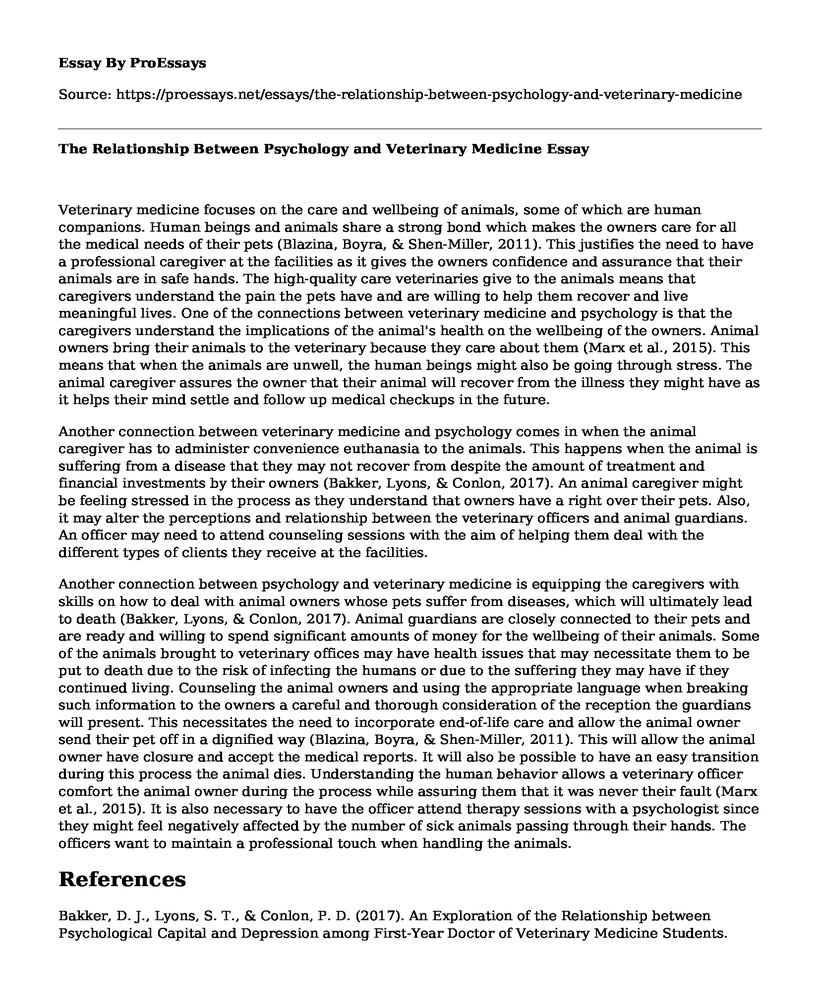Veterinary medicine focuses on the care and wellbeing of animals, some of which are human companions. Human beings and animals share a strong bond which makes the owners care for all the medical needs of their pets (Blazina, Boyra, & Shen-Miller, 2011). This justifies the need to have a professional caregiver at the facilities as it gives the owners confidence and assurance that their animals are in safe hands. The high-quality care veterinaries give to the animals means that caregivers understand the pain the pets have and are willing to help them recover and live meaningful lives. One of the connections between veterinary medicine and psychology is that the caregivers understand the implications of the animal's health on the wellbeing of the owners. Animal owners bring their animals to the veterinary because they care about them (Marx et al., 2015). This means that when the animals are unwell, the human beings might also be going through stress. The animal caregiver assures the owner that their animal will recover from the illness they might have as it helps their mind settle and follow up medical checkups in the future.
Another connection between veterinary medicine and psychology comes in when the animal caregiver has to administer convenience euthanasia to the animals. This happens when the animal is suffering from a disease that they may not recover from despite the amount of treatment and financial investments by their owners (Bakker, Lyons, & Conlon, 2017). An animal caregiver might be feeling stressed in the process as they understand that owners have a right over their pets. Also, it may alter the perceptions and relationship between the veterinary officers and animal guardians. An officer may need to attend counseling sessions with the aim of helping them deal with the different types of clients they receive at the facilities.
Another connection between psychology and veterinary medicine is equipping the caregivers with skills on how to deal with animal owners whose pets suffer from diseases, which will ultimately lead to death (Bakker, Lyons, & Conlon, 2017). Animal guardians are closely connected to their pets and are ready and willing to spend significant amounts of money for the wellbeing of their animals. Some of the animals brought to veterinary offices may have health issues that may necessitate them to be put to death due to the risk of infecting the humans or due to the suffering they may have if they continued living. Counseling the animal owners and using the appropriate language when breaking such information to the owners a careful and thorough consideration of the reception the guardians will present. This necessitates the need to incorporate end-of-life care and allow the animal owner send their pet off in a dignified way (Blazina, Boyra, & Shen-Miller, 2011). This will allow the animal owner have closure and accept the medical reports. It will also be possible to have an easy transition during this process the animal dies. Understanding the human behavior allows a veterinary officer comfort the animal owner during the process while assuring them that it was never their fault (Marx et al., 2015). It is also necessary to have the officer attend therapy sessions with a psychologist since they might feel negatively affected by the number of sick animals passing through their hands. The officers want to maintain a professional touch when handling the animals.
References
Bakker, D. J., Lyons, S. T., & Conlon, P. D. (2017). An Exploration of the Relationship between Psychological Capital and Depression among First-Year Doctor of Veterinary Medicine Students. Journal of veterinary medical education, 44(1), 50-62.
Blazina, C., Boyra, G., & Shen-Miller, D. S. (2011). The psychology of the human-animal bond. New York, NY, USA:: Springer.
Marx, C., Silveira, M. D., & Beyer Nardi, N. (2015). Adipose-derived stem cells in veterinary medicine: characterization and therapeutic applications. Stem cells and development, 24(7), 803-813.
Cite this page
The Relationship Between Psychology and Veterinary Medicine. (2022, Apr 04). Retrieved from https://proessays.net/essays/the-relationship-between-psychology-and-veterinary-medicine
If you are the original author of this essay and no longer wish to have it published on the ProEssays website, please click below to request its removal:
- Essay on Nursing: Registered Nurse Licensed Practical and Licensed Vocational Nurses
- The Effect of Patient Education and Home Monitoring on Medication Compliance
- Research Paper on Engaging Parents With Children
- Call the Midwife and the Role of the Nurse Essay
- Emergency Management Doctrine
- The Community Intervention Strategy Paper Example
- Paper Sample on Evaluating Practicum Experiences: A Self-Assessment & Strategies for Improvement







